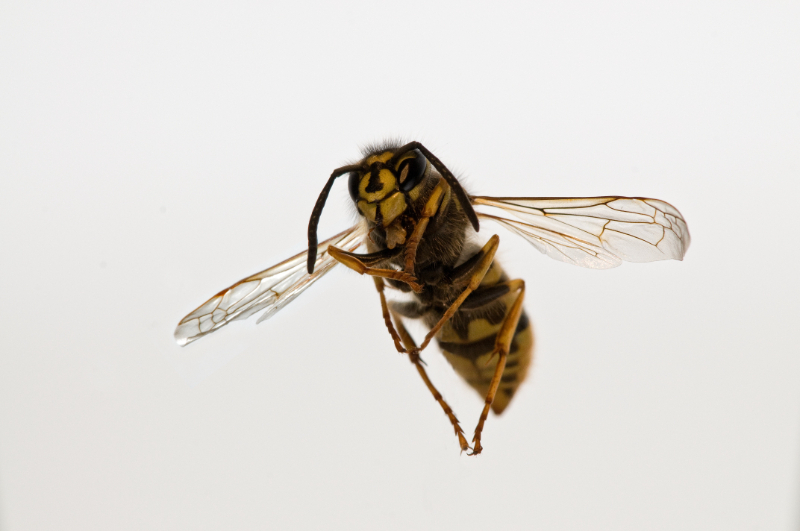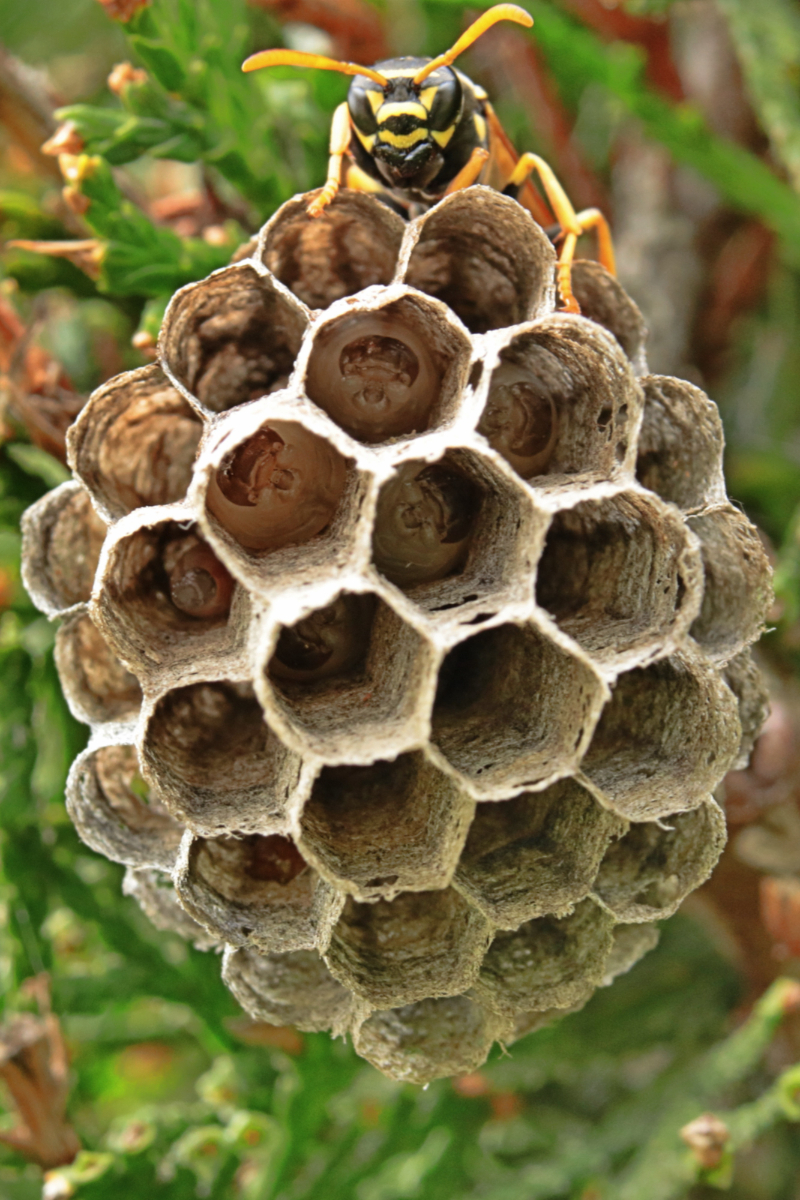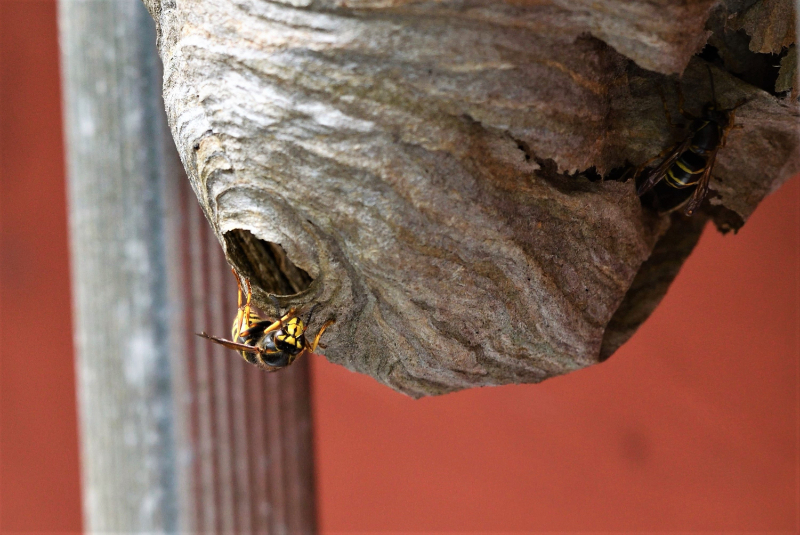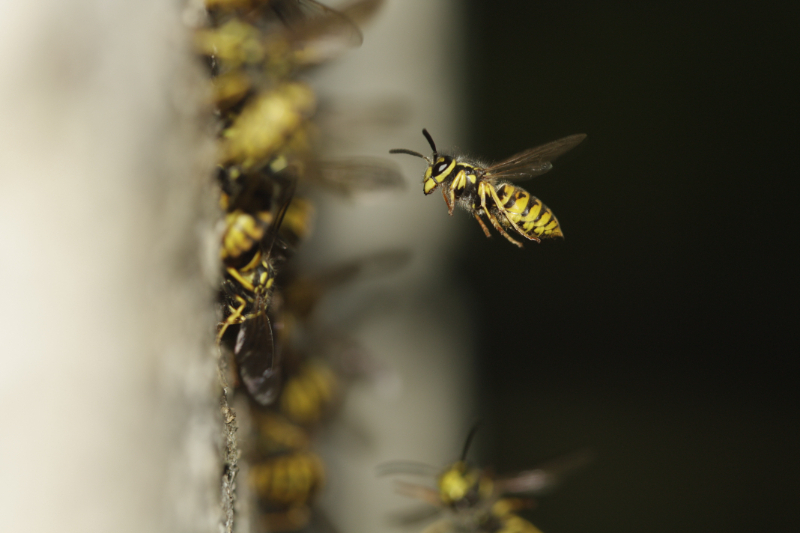Many people worry when they notice wasps buzzing around their home or garden. Pest control services, such as ourselves, are called out throughout the year to deal with wasps nests, so if you are worried about being stung, you are not alone. Whether you are thinking of handling the nest yourself or contact a professional pest control service, this guide will help you deal with annoying wasps.
Queen wasps start every wasp nest, and they tend to begin building their nests when the weather begins to get warmer in the Spring. By the time we get to late Summer, wasp nests are established colonies producing up to 300 fresh eggs every day. Besides this, up to 5,000 adults will work building the nest and feeding the larvae.
The most common species you will encounter in the UK is Vespula vulgaris or the German species Vespula germanica. These types of wasp have the typical yellow and black stripes, have very painful stings and cause dangerous allergic reactions. Some wasps may be mistaken for hornets, which are relatively rare in the UK.
The dangers: why we control wasps
Wasps are one of the most annoying, feared and aggressive pests we have to deal with in the UK. They are noted for their painful stings when they attack, which can often seem unprovoked.
However, wasps will only attack people when they feel threatened by them. When they are in distress, wasps will release a pheromone that calls the remaining wasps in their nest to back them up.
Painful wasp stings will come out at red swelling on your skin. Aside from being painful, they can also be life-threatening. Those sensitive to wasp stings can suffer from anaphylaxis, an incredibly dangerous allergic reaction that can be fatal. If you suffer an anaphylactic reaction to a wasp sting, you should seek immediate medical help by dialling 999.

Older adults, children, those with allergies and pets are all particularly sensitive to wasp stings. Therefore, if you notice a large amount of wasp activity around your home, you should arrange for a professional pest control service to come and take care of it.
Treating wasp stings
If you have been stung by a wasp, looking out for serious reactions can help you get medical treatment in time. After a sting, if you have difficulty breathing, feel dizzy or have a swollen face, call for an ambulance immediately. If you do not have an allergic reaction, your sting will still be very painful.
To attempt to treat yourself for stings from bees and wasps, the first thing to do is wash the sting with soap and water. After this, applying a cold compress, such as an ice pack, for around ten minutes. Finally, it would help if you elevated the area where the sting has occurred.
It is best not to scratch the sting or try any unofficial home remedies you have seen online. Things such as vinegar and bicarbonate soda will only serve to make the sting worse. If you find the itching gets too much, asking a pharmacist for any soothing creams or balms is your best option.
Wasps around your business
If you own a commercial business that sees many visitors, such as a restaurant or popular shop, you should take wasp and pest control very seriously. Having wasps buzzing around your business can sometimes be more than a nuisance, given the serious reactions people can have to their stings.
Wasps may even drive away your customers, leading to bad reviews and possibly people demanding refunds if they are particularly affected by the insects. Ultimately, having a professional pest control service come and remove the wasps and their nest will save your business from losing money.
As a business owner, you also have a responsibility to keep your customers and staff safe while on your property. Therefore, the best way to avoid any disruption or potential complaints, you should hire a pest controller to remove the nest from your business.
Signs of a wasp nest
The first sign that a wasp nest may be nearby is noticing many of them flying around. This is likely due to a nest or something that the wasps are attracted to, such as food or flowers, being nearby. The nests themselves come in a variety of different shapes and sizes. Their fascinating and intricate design means their population can number up to 5,000 wasps at the peak of Summer.
Wasp nests are constructed from chewed wood, which the wasps mix with their saliva to create a paper-like material. The nests are surprisingly robust, able to withstand most weather conditions, waterproof and lightweight.
Despite the variety of shapes and sizes nests can come in, each unique to the colony that built it, there are common features shared between wasp species. Common places where you will find wasp nests include:
- Bushes
- Trees
- Wall cavities
- Eaves Sheds and garages
These are by no means the only places that wasps could build a nest, with many pest control services reporting wasp nests in some of the most unusual places - from toilets to musical instruments.
If you want to pin down where the nest might be, you can track the female worker wasps as they fly back to it. Often you will find them high up, away from the ground.

Stages of a nest
In the early stages of the nest, generally constructed in early Spring, it may only be very small. Often around the size of a golf ball, these early nests only contain the colony's queen, with a small gaggle of worker wasps servicing the nest.
As Spring changes into Summer, nests can grow considerably. If left unchecked, these nests can grow to the size of a beachball, containing thousands of worker wasps, all contributing to the growing size of the colony.

The largest wasp nest ever recorded was found in New Zealand. It measured 12 feet long and was constructed by a species of German wasps - clearly drawing on the engineering prowess of their homeland. It is often best to tackle nests before they get anywhere near this size.
The earlier you treat a wasp nest, the better. In the early stages, the workers will be less aggressive in defending the colony, and you will not have as many to deal with. If you notice a nest in the early stages of construction, call your local pest control service to come and get rid of it.
Preventing wasps and their nests
Prevention is often the best way to deal with wasp nests rather than reacting once they start to build them. Luckily, there are steps you can take to prevent wasps from building in your home or business.
Doors and windows: Keeping the openings in your home securely shut will help to keep wasps out. They will often wander inside to avoid the heat in warmer months, but keeping doors and windows shut when you can will help to keep them out.
Bins: You should also take care to keep bins securely closed in the Spring and Summer. Bins are a primary source of food for wasps, and keeping them closed and away from your home or business will keep wasp nests at bay.
Check early: Checking for nests in the early Spring when they are first being built is the best way to prevent them. When they are only small and lightly defended, nests are easier to remove. It is best to check the most common places where nests are built, such as underneath trees, garages, eaves and lofts.
Getting rid of wasps and their nests

When wasps are making particular nuisances of themselves or endangering health and safety, there are many ways that professional pest controllers can remove a wasp nest. Of course, wasp removal is not an easy task and can become dangerous.
When removing a nest, wasps will feel incredibly threatened and become very aggressive. With thousands of wasps living in one nest, this can quickly lead to a swarm of aggressive, stinging wasps attacking those trying to destroy the nest. Additionally, wasps do not die after stinging you, like bees, but can and will sting you multiple times.
Of course, wasp nest removal is not always essential. As long as they are far away from buildings or homes or in unused areas of your garden, you can leave them there. After all, wasps and their queens need somewhere to live too. They will eventually abandon their nests in the Autumn, only returning in the following year in Spring and Summer.
Are you looking for wasp nest removal?
Do you have a wasp nest problem in Burton upon Trent or Staffordshire?
If you would like to find out more information about the nest control services we offer follow the link below.
wasp nest control


